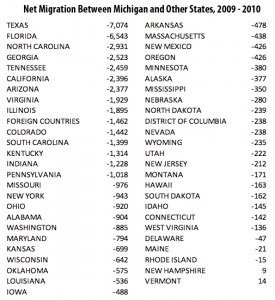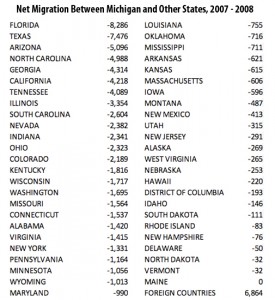Michigan lost more people in 2009-10 than once thought
Larry Rosen of Public Policy Associates in Lansing recently utilized data from the Census Bureau’s 2010 American Community Survey to analyze residential patterns for Michigan in- and out-migrants between 2009 and 2010. This analysis has drawn significant media coverage. Sometimes, though, the data can lead you astray.
The conclusion that “The data indicate a continuing exodus of residents from the state” was not surprising. And the domestic migration loss of 62,000 seemed to be in the ballpark.
However, the total net loss (factoring in an unprecedented 45,300 immigrants to Michigan) and a number of the detailed state-to-state flows raised some questions in this demographer’s mind. The most obvious questions were raised by 2009-10 numbers that went against the trends that my group, Data Driven Detroit (D3), has been documenting throughout the past decade.
A table published in the Detroit Free Press points to a net migration total loss of 16,700 residents over the year -- a number far below any year-to-year change this decade. While the net domestic loss appeared a little high based on the trends we have tracked, the immigration gain appeared way out of the ballpark. Our poor economy has attracted fewer and fewer immigrants each year.
| Editor’s note: Bridge presents, from time to time, comments from Kurt Metzger of Data Driven Detroit on demographic trends and what they mean for Michigan today, and tomorrow. Metzger worked for the U.S. Census Bureau for 15 years and has been studying demographic data and issues in Michigan for three decades. |
Several factors serve as major contributors to our year-to-year migration patterns, particularly that of the latest period. The small economic upswing experienced of late had yet to begin in the period under review by Rosen.
It's true that the economies of other states have taken a hit, resulting in fewer job opportunities for Michiganders to migrate to. And decreasing housing values in Michigan have left large numbers “underwater” on their mortgages, making it difficult for some residents to leave Michigan in pursuit of work.
Still, the table printed in the Detroit Free Press identified two state trends that made little sense to me. The first involves Ohio.
While the Buckeye State might be getting blockbuster movie investments now that our film credits have shrunk, this is not translating to a large flow of Michiganders moving to Ohio to work on "The Avengers" movie. So here I am looking at an overestimate of loss.
On the other side, what could possibly be driving Oklahoma residents to pick up stakes and head northeast toMichigan, as the Free Press table shows?
While some of you may think that is obvious, the developing “cool” of Oklahoma City and Tulsa, and the fact that Oklahoma has one of the fastest-growing economies in the nation, ranking among the top states in per capita income growth and gross domestic product growth, leads me to think otherwise. (Perhaps the fact that Oklahoma’s final average temperature for the summer of 2011, June through August, was 86.9 degrees -- hottest in the nation -- may result in resettlement in Michigan in the years to come, however.)
While agonizing over these issues the last couple of weeks (I obviously need a life), I was thrilled last week to hear that the IRS had released its state-to-state migration file for 2009-10. This is the quintessential source of migration data, covering up to 98 percent of all individual tax returns. At last, the questions that have caused me sleepless nights can be answered.
 The data have been analyzed and the results are shown in Table 1 at right.
The data have been analyzed and the results are shown in Table 1 at right.
The first thing we discover from the analysis is Michigan had a total domestic out-migration of 50,408 residents -- not 62,000. In addition, the IRS estimates that we actually had a net loss of immigrants, as emigration won out by 1,462, resulting in a total out-migration loss for Michigan of 51,870 residents. This is three times higher than the figure reported by the Free Press. (We also must acknowledge that 7,947,301 Michigan residents stayed put. They might have changed residences, but they stayed in the state.)
When we look at the details at the state level, we find similarities between the census figures and the IRS figures, with Texas and Florida as top destinations for those leaving Michigan, followed byNorth Carolina, Georgia andTennessee. Other top destinations for Michigan emigrants were California, Arizona and Virginia. The only Great Lakes or Midwest state to reach the top 10 was Illinois.
It is clear that Ohio is not a significant destination for Michigan emigrants, as it ranks 17th, with a number less than 20 percent of the census migration total.
A look at Oklahoma through the IRS figures also supports the trend of a pull from, rather than a push to, Michigan. Oklahoma did not send residents to Michigan; rather, it was a net importer of 575 former Michiganders.
 Only New Hampshire and Vermont actually sent more people to us than they got from us. While this net gain covers only 23 people, we still need to remember to thank them whenever the opportunity presents itself.
Only New Hampshire and Vermont actually sent more people to us than they got from us. While this net gain covers only 23 people, we still need to remember to thank them whenever the opportunity presents itself.
Now for some good news.
While emigration between 2009 and 2010 cost Michigan more than 51,000 residents, it is a vast improvement over the 2007-08 period, the most damaging one of the decade. That year brought us a net loss of 72,127. (Table 2 provides a picture of the state-by-state detail.)
The moral of the migration story applies to data in general – be cognizant of your data sources because they can tell very different stories.
Our mission at Data Driven Detroit is to collect, vet and understand all data sources, so we can provide the public with the best, most accurate information available.
Business Watch
Covering the intersection of business and policy, and informing Michigan employers and workers on the long road back from coronavirus.
- About Business Watch
- Subscribe
- Share tips and questions with Bridge Business Editor Paula Gardner
Thanks to our Business Watch sponsors.
Support Bridge's nonprofit civic journalism. Donate today.
See what new members are saying about why they donated to Bridge Michigan:
- “In order for this information to be accurate and unbiased it must be underwritten by its readers, not by special interests.” - Larry S.
- “Not many other media sources report on the topics Bridge does.” - Susan B.
- “Your journalism is outstanding and rare these days.” - Mark S.
If you want to ensure the future of nonpartisan, nonprofit Michigan journalism, please become a member today. You, too, will be asked why you donated and maybe we'll feature your quote next time!

